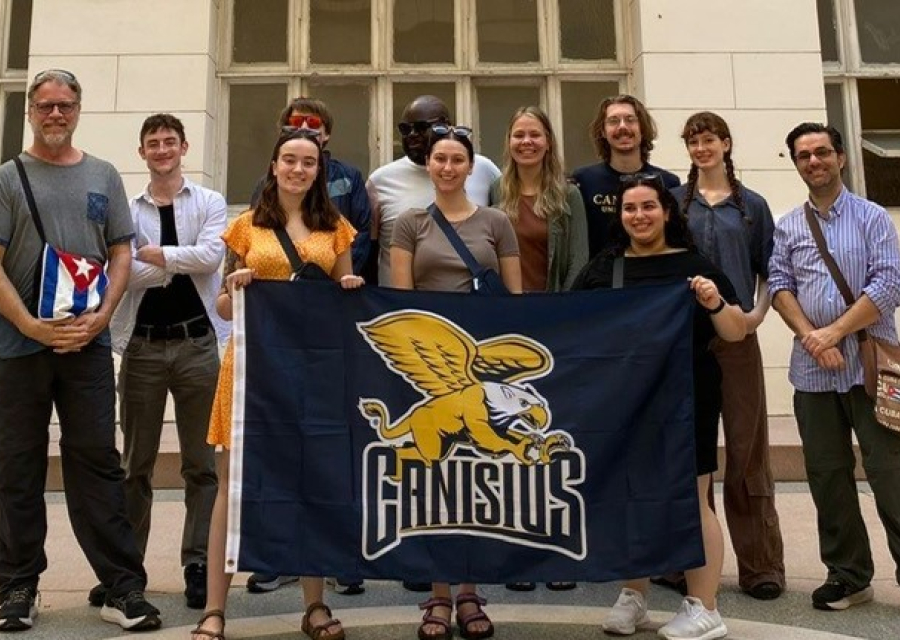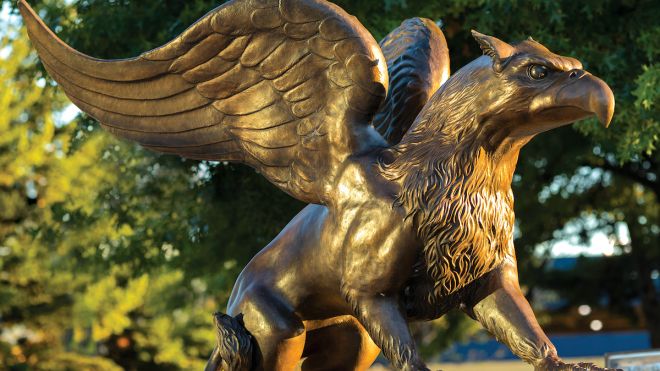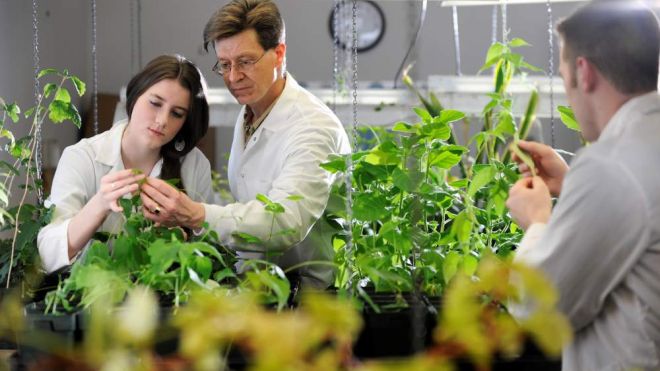
Buffalo, NY – A contingent of Canisius students, alumni and faculty recently returned from a two-week study abroad experience in the Republic of Cuba. The Caribbean country, located just 94 miles off the coast of Florida, has been somewhat of a forbidden land for American tourists since the Cuban Revolution in 1959, when the U.S. government cut all diplomatic and economic ties. General tourism for Americans remains limited to professional research, humanitarian projects, family visits, and religious or educational activities. The Canisius students traveled to Cuba under the Educational License. Most were enrolled in the university’s All-College Honors program and/or are pursuing majors or minors in Spanish. Alumni who participated in the study abroad traveled under the Support of the Cuban People License.
“The purpose of this two-week trip was to provide students with a richer understanding of language, culture, religion and history of Cuba, and what the Cuban Revolution accomplished for the country and what still needs to change,” explains Richard D. Reitsma, PhD, associate professor of modern languages, literatures and cultures and chair of the Spanish Department. Reitsma and Davide Salvo, PhD, adjunct professor of classics, organized and led the study abroad to Cuba.
The experience took nearly one year to plan, as U.S. policy mandates that American students can only receive college credit for courses offered by an accredited U.S. institution. In essence, this meant Reitsma had to develop the coursework Canisius students would study while in Cuba.
Comprised largely of open-air classes, students participated in guided tours of Old Havana, which included a visit to Our Lady of Regla Catholic Church (the Virgin of Regla is the patron saint of Havana) and a Yoruba temple, where students learned about aspects of AfroCuban religious practices. Also in Havana, Canisius students visited the former presidential palace that is now the Museum of the Revolution, met with famed Cuban painter Saulo Serrano, explored the Fine Art Museum of Classical Art, attended an exhibit of Cuban film posters, and toured the home of American novelist and Nobel Prize winner Ernest Hemingway.
“Every day was something new, with plenty of opportunities to see the country and what it had to offer,” said Joanna L. Fiorella ’24, who was inspired to participate in the study abroad after taking Reitsma’s course on Cuban cinema. “Cuba and America are not on the best terms so to be able to experience the country through this study abroad experience was a once-in-a-lifetime opportunity I could not pass up.”
“I chose to study abroad in Cuba due to my lack of knowledge regarding the country,” says Mason M. Bowes ’24. “The United States has had a long and tense relationship with Cuba for quite a long time and I felt this would be a great opportunity to learn about the country in a way that may go against the U.S.’s traditionally villainized perception of it.”
In addition to Old Havana, the Canisius contingent traveled to Trinidad, Matanzas and Santa Clara. During their stopovers, students learned about Cuban slavery, the influence of Africa on Cuban language, cuisine, religious and cultural practices, and the economy. The diverse experiences throughout the trip shattered many stereotypes and myths students previously had about the Cuban nation.
“Going on this trip helped me understand the complexities of my own government,” recalls Bowes. “Prior to college, my understanding of Cuba was shaped by American ideology. A lot of the social and governmental issues that exist within Cuba are due to structural issues caused by the United States intervening within democratically held elections. This was concerning to realize and helped me recognize that I had a lot of preconceived biases regarding Cuba and its relationships with the United States.”
“For me, the great social justice issue in Cuba is the current economic situation,” adds Fiorella. “As Americans coming into this study abroad, we had the means to pay for gas, food and lodging. Cubans do not make enough money to support their families without an incoming coming in from elsewhere.”
Fiorella and Bowes were among the seven Canisius students who made the trip to Cuba. The others were: Jordan S. Juback ’24, Adelina C. Metz ’24, Samantha E. Militello ’24, Kaitlin M. O’Meara ’26 and Eamon A. Wallace ’24.
For more information about Canisius’ study abroad experience in Cuba, contact University Communications at 716-888-2792.
Canisius was founded in 1870 in Buffalo, NY, and is one of 27 Jesuit colleges and universities in the U.S. Consistently ranked among the top institutions in the Northeast, Canisius offers undergraduate, graduate and pre-professional programs distinguished by close student-faculty collaboration, mentoring and an emphasis on ethical, purpose-driven leadership.



